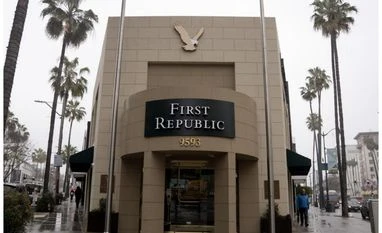By Jenny Surane, Hannah Levitt and Katherine Doherty
The fate of First Republic Bank has become a game of chicken between the US government and the lender’s largest rivals, with both sides seeking to avoid steep losses and hoping the other will handle the troubled firm.
As the bank’s stock keeps lurching lower — dropping 49% on Tuesday and 30% on Wednesday — regulators have so far refrained from stepping in. They’ve waited to see if banks that deposited $30 billion into First Republic last month can hash out a deal to ensure the firm doesn’t fail and take some of their money with it.
Senior officials at the Federal Deposit Insurance Corp. have even discussed whether to lower their private assessment of the bank, a move that would curb its access to a pair of Federal Reserve lending facilities.
On the other side, executives at several big banks are balking at getting even more involved in a way that would lock in losses. Some expect that if they wait, they will get at least some of those deposits back — and might fare even better than if they intervene, potentially throwing good money after bad.
“There is some nervousness about how Silicon Valley Bank went down, and maybe they’d like to see if First Republic can work out its problems itself,” said Stephen Lubben, a professor at Seton Hall University School of Law.
“Regulators are also probably worried that if this does not stop, who is next?” he said. “That is, who comes after First Republic on the hot seat?”
Also Read
A spokesperson for First Republic declined to comment.
First Republic’s issues stem from its stockpile of loans at low interest rates, including an unusually large portfolio of jumbo mortgages to wealthy clients. Those debts have lost value amid Federal Reserve hikes, prompting some depositors to yank their money.
After the collapse of Silicon Valley Bank in March stoked concerns about the soundness of regional lenders, First Republic was left paying more for funding than it earns on many of its assets. That means the firm faces what analysts predict will be at least a year of losses.
The bank remains fully operational, and executives emphasized in an earnings report on Monday that it has more than ample access to cash to serve clients. Still, its leaders acknowledged that they are looking for strategic options.
The clock for striking such a deal began ticking louder late last week. US regulators reached out to some industry leaders, encouraging them to make a renewed push to find a private solution to shore up First Republic’s balance sheet, according to people with knowledge of the discussions.
The calls also came with a warning that banks should be prepared in case something happens soon.
Proposed Deals
A number of rescue proposals have so far failed to come to fruition.
Earlier this week, Bloomberg reported that First Republic was looking to potentially sell $50 billion to $100 billion of assets to big banks that would also receive warrants or preferred equity as an incentive to buy the holdings above their market value.
By Wednesday, the firm’s advisers were privately pitching a similar concept, in which stronger banks would buy bonds off of First Republic’s books for more than they were worth so that it could sell shares to new investors. While that would mean booking initial losses, banks could hold the debts through repayment to be made whole.
In that scenario, the proponents suggested, big banks might save money by ensuring the safety of their $30 billion in deposits and avoiding a special FDIC assessment if the regulator were to step in.
But executives at five of the biggest banks, speaking on the condition they not be named, dismissed the notion of once again banding together to prop up First Republic, especially when it could mean paving the way for investors or a competitor to scoop up the firm at a bargain price.
One expressed a willingness to participate — only if regulators forced the group to take action.
Recovering Deposits
Several banks would prefer that, if it becomes necessary, the FDIC seize First Republic and sell it off. Such a resolution, they said, would be cleaner, even if banks lose money. Some have already taken reserves.
The group of banks accounted for most of First Republic’s $50 billion of uninsured deposits at the end of the first quarter. But, as depositors, they would be at the front of the line to recover money if First Republic were resolved. Two executives whose firms contributed $5 billion apiece in deposits last month said they would expect to at least retrieve some — though not all — of that money in a worst-case scenario.
Across the industry, First Republic’s quarterly earnings report on Monday has come to be regarded as a disaster. The firm announced a larger-than-expected drop in deposits, then declined to take questions as executives presented a 12-minute briefing on results.
The shares promptly tilted into a dive in late trading that day. Altogether, they’re down 95% this year. They gained 15% in Thursday’s trading at 9:57 a.m. in New York.
Industry executives said it’s possible that — regardless of the stock — First Republic can press onward indefinitely.
And the FDIC has shown it’s in no rush to seize the firm and take another multibillion-dollar hit to its insurance fund.
For would-be rescuers, the collapse of SVB and Signature Bank offered an unfortunate reminder last month: Bidders can sometimes score the most lucrative deal by being patient and waiting to scoop up a bank or its assets once the agency intervenes.
After those two lenders were sold off, both of the acquirers saw their stocks pop.
)